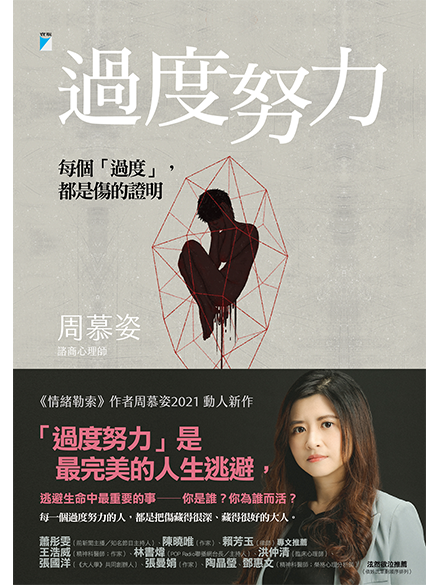Read previous part: https://booksfromtaiwan.tw/latest_info.php?id=234
Beyond books that helped to identify the damage done, we have also seen a slew of titles focusing on the gradual process of recovery. Malaysian family therapy proponent Feng Yi-liang’s (馮以量) Allow Yourself to Choose Love (允許自己選擇愛) and With Whose Trauma are You Burdened? (你背負了誰的傷), for instance, guide readers through a process of reconciliation with life’s hardships and traumas. Counseling psychologist Chou Mu-Tzu’s (周慕姿) Trying Too Hard: Why We Can Never Do Enough (過度努力) exposes how seeking perfection is a behavior that derives from past trauma and argues that the path to self-acceptance begins by identifying the source of one’s trauma.

Trying Too Hard: Why We Can Never Do Enough
Despite the diversity of subject matter represented by recently published works in the self-help book market, the many branches and schools of thought, and the divergence of focus on various kinds of relationships or age groups, the exploration of mental health cannot be divided by country or language because mental health issues are ultimately a human subject that exists in all cultures.
In these past few years, Aquarius Publishing has seen that in addition to Mainland China , Korean, Thai, Vietnamese, and Indonesian outfits have also showed heightened interest in securing publishing rights for self-help books. Thanks to Books from Taiwan, who promoted our books and served as our publishing liaison in negotiations, the publishing rights for the Aquarius titles mentioned above have all been sold abroad. Certain trends in global markets can be derived from the titles Aquarius has sold abroad: relationships, emotions, family and self-affirmation seem to be common areas of interests across international borders.
As someone with over 20 years of experience in publishing, I’ve noticed that dynamics in preferences for certain book topics seem to follow a cyclical flow not unlike fads in fashion, where preferences for skinny jeans seem to alternate with baggy jeans in a recurrent pattern. However, these so-called trends are never a sure bet. For instance, a trend may develop when a certain kind of book sells well, which then leads many other people in that field to release their own books. However, this can also lead to a fairly inconsistent standard of quality. Oftentimes, if one only realizes the market is saturated after blindly following a certain trend to the point that sales fall off, the realization will have come too late.
A successful publisher doesn’t pick out the prettiest flower from their own garden, but rather branches out into far-flung fields to find exotic flowers not yet available back home. At the same time, they must also identify the dry patches in their own garden and fill in the empty spots where needed.
For instance, we are all concentrated on the lives we live, but we also have to learn how to accept death—this is the focus of Su Shun-Hui (蘇絢慧), an author that writes about recovering from grief and whose book And Then, I Was Finally Able to Say Goodbye (於是,我可以好好說再見) seeks to guide readers through the pain of losing a loved one. In a similar vein, Shang Pei-yu’s (商沛宇) A Cancer Clinical Psychologist’s Healing Bag of Tricks (癌症心理師的療心錦囊) is a monograph written in solicitude and care for cancer patients and their families.
In the verdant garden of Taiwan’s book market, a book that will someday become a bestseller is just one of many seeds with a bright future, while those topics that have not yet taken root in the market have unlimited potential for development.